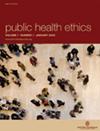新冠肺炎选择性强制疫苗接种的伦理
IF 2
3区 哲学
Q2 ETHICS
引用次数: 14
摘要
摘要有证据表明,几个司法管辖区对疫苗犹豫不决,需要考虑强制接种新冠肺炎疫苗。在这篇论文中,我认为,对严重疾病风险最高的老年人强制接种新冠肺炎疫苗是合乎道德的,但如果发生这种情况,尽管对疾病和疫苗的了解有限,但不太可能有足够的理由强制接种风险较低的人的疫苗。根据危害原则,强制为重症高危人群接种疫苗是合理的,因为有证据表明,这将消除新冠肺炎对公共健康的严重威胁。疫苗接种的风险-收益状况也更清楚地符合高危人群的利益,因此强制接种疫苗对他们来说成本较低。因此,有选择的授权将在风险分配方面创造公平。授权所施加的胁迫程度需要适度,很可能需要多种方法来提高疫苗的接种率。然而,新冠肺炎疫苗的选择性授权可能是一种道德选择,决策者应予以考虑。本文章由计算机程序翻译,如有差异,请以英文原文为准。
The Ethics of Selective Mandatory Vaccination for COVID-19
Abstract With evidence of vaccine hesitancy in several jurisdictions, the option of making COVID-19 vaccination mandatory requires consideration. In this paper I argue that it would be ethical to make the COVID-19 vaccination mandatory for older people who are at highest risk of severe disease, but if this were to occur, and while there is limited knowledge of the disease and vaccines, there are not likely to be sufficient grounds to mandate vaccination for those at lower risk. Mandating vaccination for those at high risk of severe disease is justified on the basis of the harm principle, as there is evidence that this would remove the grave public health threat of COVID-19. The risk–benefit profile of vaccination is also more clearly in the interests of those at highest risk, so mandatory vaccination entails a less severe cost to them. Therefore, a selective mandate would create fairness in the distribution of risks. The level of coercion imposed by a mandate would need to be proportionate, and it is likely that multiple approaches will be needed to increase vaccine uptake. However, a selective mandate for COVID-19 vaccines is likely to be an ethical choice and should be considered by policy-makers.
求助全文
通过发布文献求助,成功后即可免费获取论文全文。
去求助
来源期刊

Public Health Ethics
PUBLIC, ENVIRONMENTAL & OCCUPATIONAL HEALTH-MEDICAL ETHICS
CiteScore
3.10
自引率
9.50%
发文量
28
审稿时长
>12 weeks
期刊介绍:
Public Health Ethics invites submission of papers on any topic that is relevant for ethical reflection about public health practice and theory. Our aim is to publish readable papers of high scientific quality which will stimulate debate and discussion about ethical issues relating to all aspects of public health. Our main criteria for grading manuscripts include originality and potential impact, quality of philosophical analysis, and relevance to debates in public health ethics and practice. Manuscripts are accepted for publication on the understanding that they have been submitted solely to Public Health Ethics and that they have not been previously published either in whole or in part. Authors may not submit papers that are under consideration for publication elsewhere, and, if an author decides to offer a submitted paper to another journal, the paper must be withdrawn from Public Health Ethics before the new submission is made.
The editorial office will make every effort to deal with submissions to the journal as quickly as possible. All papers will be acknowledged on receipt by email and will receive preliminary editorial review within 2 weeks. Papers of high interest will be sent out for external review. Authors will normally be notified of acceptance, rejection, or need for revision within 8 weeks of submission. Contributors will be provided with electronic access to their proof via email; corrections should be returned within 48 hours.
 求助内容:
求助内容: 应助结果提醒方式:
应助结果提醒方式:


